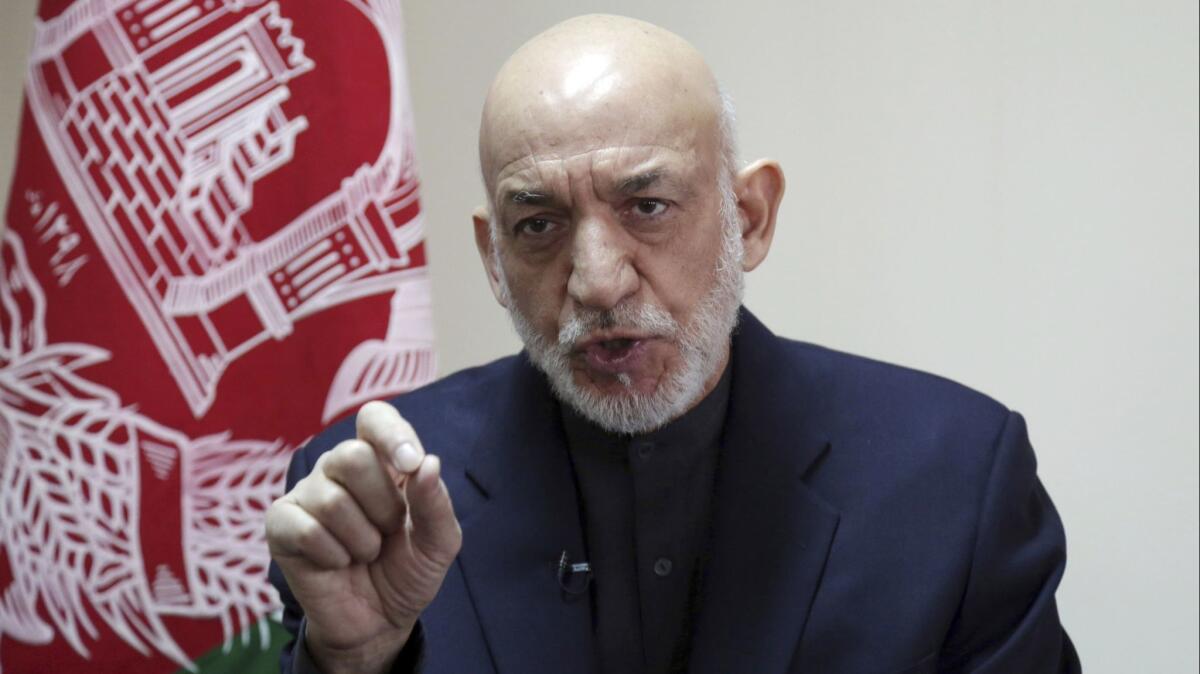Crucial summit between Afghan leaders and Taliban is canceled

- Share via
Reporting from KABUL, Afghanistan — Talks between Afghan leaders and Taliban insurgents that were scheduled to begin Friday were canceled, in a move seen as a blow to a U.S.-led peace process in the country.
The talks, which were to start in Doha, Qatar, where the Taliban maintain an office, were considered a significant first step toward finding a negotiated end to the war in Afghanistan, America’s longest conflict, and the eventual withdrawal of U.S. troops from the country.
It would have marked the first time that Taliban and Afghan government officials sat together, with the Taliban previously refusing to hold direct talks with the Kabul government, calling it a puppet of the U.S. Leaders of the group subsequently gave in to pressure and agreed to talks that included Kabul representatives, though they said they would recognize them only as ordinary Afghans, rather than government officials or ministers.
On Thursday, however, Qatar’s Center for Conflict and Humanitarian Studies, which is sponsoring the talks, announced an indefinite postponement, saying “this is unfortunately necessary to further build consensus as to who should participate in the conference.”
Plans for the talks went awry when the Qatari hosts said the Afghan government side could bring 243 people to the talks. Their lists differed from Afghan President Ashraf Ghani’s list of 250 people, which included many more women, according to a senior government official who spoke on condition of anonymity because he was not authorized to speak to the media.
In a statement Friday, the Taliban said Ghani had sabotaged the talks by declaring the people on his list were government representatives. Ghani in turn blamed the Taliban for scuttling the talks by getting Qatar to allow a different list, one that had dropped several government ministers and 44 women.
Afghanistan’s former president, Hamid Karzai, said Friday that peace in his homeland, ravaged by more than 17 years of war, will only be possible when Afghans from all sectors of society sit together and negotiate — including the Taliban.
Karzai expressed disappointment that the scheduled gathering for Afghan-to-Afghan talks was off. In an interview with the Associated Press, Karzai would not blame either side for the cancellation, instead urging the United States to “put force behind it to make it [the talks] happen.”
He also praised Washington’s peace envoy, Zalmay Khalilzad, as “the very best person for the job” of resolving the Afghan crisis.
“I believe the United States wants some sort of settlement in Afghanistan,” Karzai said. “I do believe that, but I want the U.S. to be much clearer about its roadmap ... to do everything it can to make the process move forward.”
Karzai was not among those planning to attend Qatar talks but he had attended a round-table meeting in February in Moscow in which the Taliban met with dozens of prominent Afghans.
Though government representatives were not sent by Ghani to Moscow, there were some senior officials present, including a deputy to Afghanistan’s chief executive, Abdullah Abdullah, as well as a member of a government-appointed High Peace Council. Ghani was critical of the Moscow meeting.
The organizers in Qatar could take lessons from the Moscow meeting, Karzai said.
“Together with the Taliban we all sat together under the Afghan flag,” he said. “We discussed the constitution, women’s rights. Why couldn’t this happen this time?”
Karzai said he has pressed the Taliban to talk directly with the government, but urged the government to be the bigger side and look at an intra-Afghan dialogue that does not have an official government seal as a possible precursor to direct talks.
“The process has to continue,” Karzai said. “I am sad today, but still hopeful as ever that we will definitely ensure an intra-Afghan dialogue takes place.”
“This is what Afghans want. They want peace. We need to be united,” he said.
More to Read
Sign up for Essential California
The most important California stories and recommendations in your inbox every morning.
You may occasionally receive promotional content from the Los Angeles Times.










